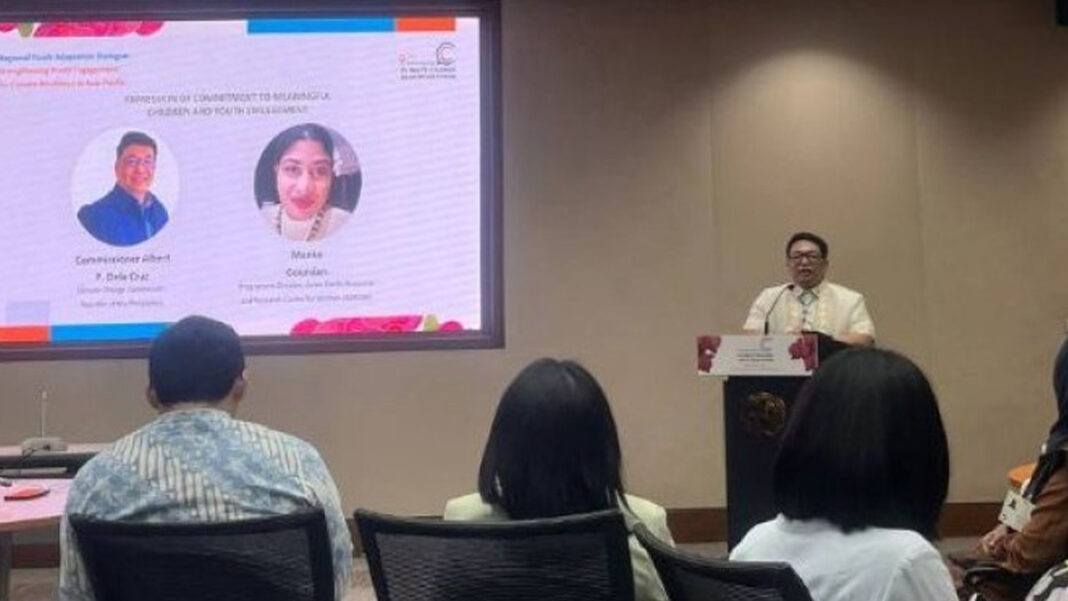The Climate Change Commission (CCC) shared the Philippines’ steadfast efforts to strengthen climate change adaptation at the Asia-Pacific Climate Change Adaptation Forum (APAN Forum) 2025 in Bangkok, Thailand.
In a news release on Friday, the CCC said the forum, held from Sept. 29 to Oct. 3, opened with the Peer Learning Cohort Event (PLCE) on Strengthening Monitoring, Evaluation, and Learning (MEL) Systems in National Adaptation Plan (NAP) Processes, co-organized by the NAP Global Network (NAP GN) and the Government of Thailand.
The workshop gathered representatives from Thailand, Bhutan, Malaysia, the Philippines, Timor-Leste, Tonga, and Vietnam to deepen collective learning on MEL systems for adaptation planning.
The cohort provided a collaborative platform for countries to share experiences, identify challenges, and explore opportunities to strengthen national MEL systems that support NAP processes.
Discussions focused on governance, financing, indicators, and institutional arrangements needed for effective adaptation tracking and reporting.
As part of the continuing cohort activities, the NAP GN hosted a parallel session titled “From Data to Decisions: Strengthening MEL for NAP Processes for Transformational Adaptation,” where CCC presented the Philippines’ experience in developing the adaptation chapter of its First Biennial Transparency Report (BTR).
The CCC underscored the Philippines’ strong national ownership and commitment to transparency, emphasizing that while adaptation reporting in the BTR is voluntary, it was intentionally included since adaptation remains central to the country’s climate strategy.
The Commission also shared key lessons from the process, including the importance of early coordination, capacity building, and leveraging existing systems to ensure data consistency and institutional alignment.
The CCC stressed that international reporting should serve not merely as a compliance exercise but as a transformational enabler that promotes transparency, accountability, and evidence-based policymaking.
“The Philippines is building a robust and transparent system where international reporting directly informs and empowers local action. Our participation in forums like APAN is crucial for integrating these global lessons into our national framework, ensuring our NAP remains a dynamic and effective blueprint for resilience,” CCC Vice Chair and Executive Director Robert E.A. Borje said.
During the Regional Youth Adaptation Dialogue: Strengthening Youth Engagement for Climate Resilience in Asia-Pacific, CCC Commissioner Albert Dela Cruz joined as a speaker alongside hosts from the UNFCCC RCC Asia Pacific, Youth Empowerment in Climate Action Platform (YECAP), UNDP Bangkok Regional Hub, UN Women, and ChildFund International.
Dela Cruz highlighted the vital role of youth in national and local climate governance through mechanisms such as the Sangguniang Kabataan, underscoring the power of youth-led innovation and advocacy in advancing climate adaptation.
He called on young leaders to “influence decision-makers, challenge unsustainable practices, and drive systemic change”.
In the forum’s Plenary Session on “Interplay of Enablers,” Dela Cruz discussed the Philippines’ whole-of-government approach to implementing its National Adaptation Plan (NAP), which was developed through an inclusive process involving youth, women, and Indigenous Peoples.
He emphasized the need to laymanize climate language so that adaptation planning becomes understandable and actionable at the household and community levels.
“Climate change is not only a national or global issue—it is a personal and family concern affecting lives, livelihoods, and resources,” he said.
The CCC reaffirmed the Philippines’ commitment to transformational adaptation through robust monitoring and evaluation, inclusive policymaking, and active regional collaboration.
The week-long APAN Forum is the largest gathering of adaptation practitioners in the Asia-Pacific region, providing a platform for governments, development partners, civil society, and research institutions to exchange knowledge and collaborate on climate adaptation strategies.
With the theme “Resilience for All: Catalyzing Transformational Adaptation,” the 9th APAN Forum brought together over 700 participants from more than 40 countries, including representatives from government agencies, United Nations bodies, multilateral organizations, academia, youth networks, and civil society. (PNA)


